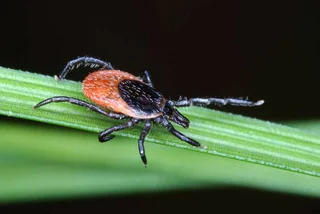Czech and American scientists have successfully isolated antibodies that are effective against the tick-borne encephalitis virus (TBEV). Their study was published in the Journal of Experimental Medicine.
The antibodies came from six patients who had a perfect immune response to the virus. In the future, these antibodies could be used as a prevention as well as a cure of the disease.
Scientists from the Institute of Parasitology, a part of the Biological Center of the Czech Academy of Sciences in České Budějovice, worked in cooperation with the Research Institute of Veterinary Medicine in Brno, and Rockefeller University in New York in a pre-clinical study. Last year's Nobel Laureate in Physiology and Medicine, Charles M. Rice, also contributed to the research.
Doctors from the České Budějovice Hospital in South Bohemia in 2018 screened TBEV patients and selected 140 blood samples with the highest quality antibodies. The researchers sent the samples to Rockefeller University.
"It was at this phase of the research that the Nobel Prize–winner Charles Rice also took part. He prepared pseudo-viruses for testing, which are viral particles that have the same structural properties as tick-borne encephalitis viruses, but are not infectious," Daniel Růžek, head of the Czech Virology Team from the Institute of Parasitology and the Research Institute of Veterinary Medicine, said.
From these selected samples, the researchers then selected six patients whose antibodies fought tick-borne encephalitis most effectively.
"We knew these patients well, they were in our care in the acute phase of the tick-borne illness, and even after they were released from the hospital, we monitored them in the counseling center of our department," Aleš Chrdle, head of the infectious disease department of the České Budějovice Hospital, said.
"Interestingly, these were not the patients with the most severe course of the illness, yet, as some themselves said, they would not want to experience it again and would not wish it on anyone else," Chrdle said.
"When we explained the meaning of the study to them, they were very helpful and helpful, each donating half a liter of blood. Thanks to their contribution, a preparation can be created in the future that will help other patients," he added.
Researchers at the Institute of Parasitology in České Budějovice tested the individual antibodies on live viruses, both in cell cultures and in mice. "The monoclonal antibodies worked absolutely fantastically. On one hand, they were able to completely prevent the development of the disease when administered before infection, but at the same time they were highly effective, even when administered after infection, so they had a therapeutic effect," Růžek said.
Tick-borne encephalitis affects the human central nervous system, and the number of cases in Europe has increased significantly in recent years. Although there has been an effective vaccination, no antiviral agent has been available for the treatment, only supportive care. The newly developed antibodies thus offer great potential.
"The theory is that if a person finds an attached tick, has it tested in the laboratory and finds that the tick was positive, it would be possible to immediately give him these antibodies, which would immediately protect him from the development of the disease," Růžek said. The sooner the antibodies are administered, the better they work.
The antibodies also have a preventive effect. In a pre-clinical study, researchers genetically engineered these antibodies to extend their effectiveness to two months. The future preparation would be used, for example, by travelers who are going to the area with tick-borne encephalitis. If antibodies are administered, they would be protected from the disease immediately for at least two months, while it takes longer for the vaccine to take effect.
Although the newly developed antibodies are very promising and their safety has been verified in a pre-clinical study in mice, there is still a long way before there is a finished preparation. If further trials are successful, it will still take several years for the preparation to reach the market.












 Reading time: 3 minutes
Reading time: 3 minutes 
























